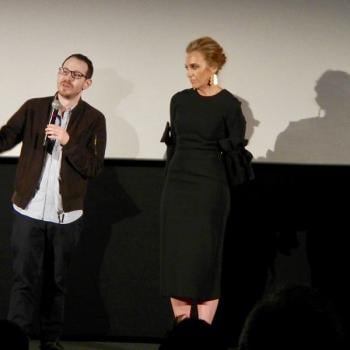
Source: Wikimedia user Buerobaldham
License
Rainer Werner Fassbinder (I do not know the man) believed in love. He believed in its power to degrade and to destroy. Franz Biberkopf in Fox and His Friends (1975) wins the lottery and the love of a wealthier man, only to find that the object of love is never inert. In a Year of 13 Moons’ degendered protagonist Edwin/Elvira seeks castration to satisfy the joking desires of their supposed soulmate. The eponymous Martha (1974) sacrifices independence and happiness for a meet-cute turned house imprisonment at the whim of an abusive husband.
But I reiterate that Fassbinder is no unbeliever. Love is ineluctable. We love because it inspires and elevates us, makes us human, even dignifies us. Take the title character from The Marriage of Maria Braun (1979), whose love for her husband spans the Second World War into the Wirtschaftswunder. Cruel in her professional life, yet utterly submissive to her loutish husband, her worldly success and sense of self come entirely from this commitment, one she has made. She remains the agent, even if that agency directs itself to serving another.
Fassbinder, along with the medieval troubadours, agrees with the Bob Dylan line, “You’ve gotta serve somebody.”
Jail Bait (1972), a notoriously difficult-to-find TV movie of his that I’ve happily obtained a copy of, shows how early this concern emerges in his work.
As the title perhaps suggests, this is an underage love story. At least on one side. Hanni (Eva Mattes) is fourteen and from a lower middle-class family. Her father, Erwin (Jörg von Liebenfelß) is a truck driver who wistfully remembers his days on the Eastern Front during World War Two. She meets Franz (Harry Baer) in town one day. He rides a motorcycle and sports a ducktail pompadour. It is the 1970s, but Fassbinder wants us to attend to his bad-boy image, the way he represents the destruction of the family unit. Naturally enough, the two have sex in a nearby barn.
Franz is 19. Between his looks, his age, and the freewheeling way he treats Hanni, every frame of the film screeches at us to look out. He is a bad man. Something bad this way comes. But we are dealing with Fassbinder here, and Fassbinder is no fan of the conventional.
Hanni quickly wins the upper hand in the relationship. Franz ends up in jail. His girlfriend becomes more demanding. She wants him to shoot her father, so they, along with their unborn child, can escape his tyranny, that is, his desire to keep his minor daughter away from an adult day laborer and slaughterhouse employee. Franz seems conflicted. He knows he shouldn’t kill Erwin. But he loves Hanni. And she plays to his masculine desire to protect…
It should be clear that this film is “problematic” in the parlance of our times. Fassbinder is a pervert in the etymological sense. He likes to upend conventions and expectations. His point, however, isn’t to argue that children can sexually manipulate adults. The prurience of the subject matter is there for melodramatic effect. What matters, as always, is that love degrades and destroys.
Nowhere does he make this clearer than the final scene, which is amongst his earliest to hit that note of utter despair he so loved. The object of love is never inert. Watch out.











